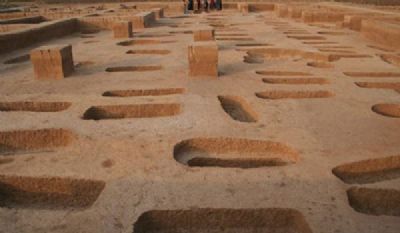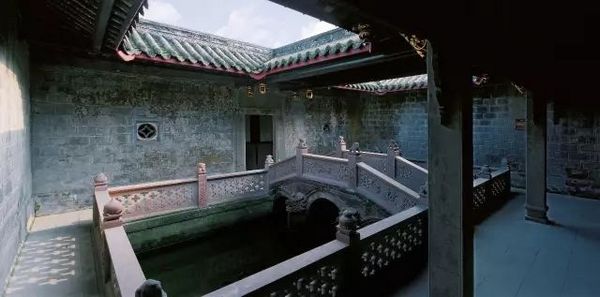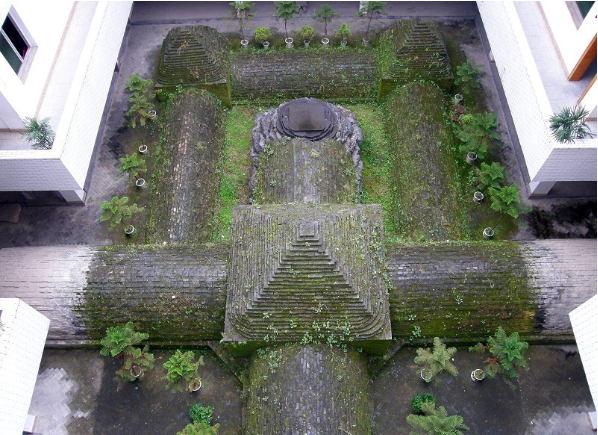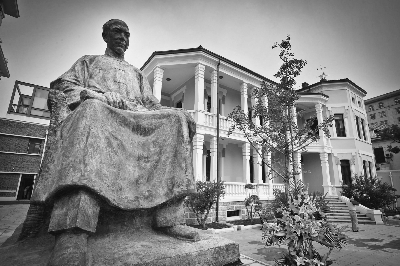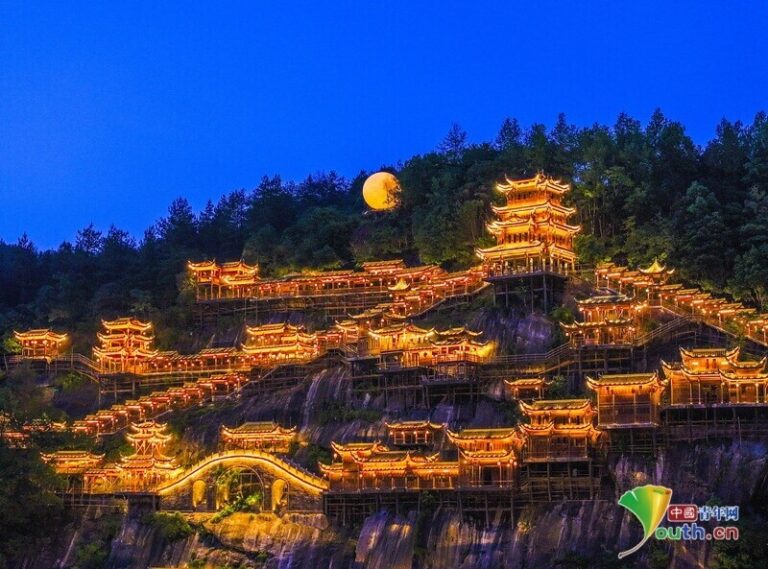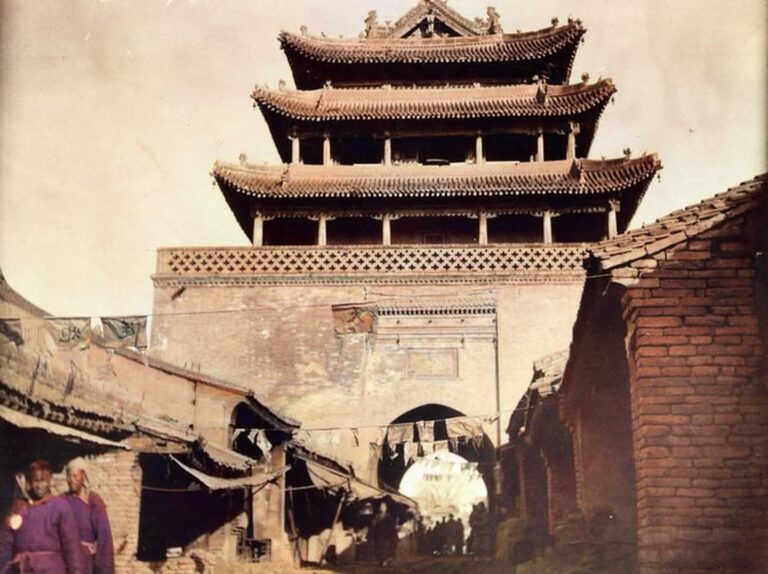Ningbo Ayuwangsi: Unveiling the Best Local Experiences in Zhejiang
An Essential Guide to Visiting Ningbo Ayuwangsi
In This Guide
- An Essential Guide to Visiting Ningbo Ayuwangsi
- The Rich History of Ningbo Ayuwangsi
- Main Highlights: What to See at Ningbo Ayuwangsi
- Planning Your Visit: A Practical Guide
- Tickets, Hours, and Booking
- How to Get There
- Local Cuisine and Accommodation
- Frequently Asked Questions
- Final Thoughts on Your Trip
Nestled among the lush mountains of Ningbo, Zhejiang Province, lies a sanctuary of peace and spirituality known as Ningbo Ayuwangsi (阿育王寺). This ancient temple, dating back to the early 3rd century, is not just a site of architectural beauty; it is a revered destination for those seeking to connect with the profound teachings of Buddhism. As one of the few temples in China named after the renowned Indian Emperor Ashoka, who played a pivotal role in spreading Buddhism across Asia, Ayuwangsi holds a unique place in the heart of the Buddhist community.
The temple is celebrated for housing the sacred relics of Shakyamuni Buddha, which elevates its status as one of the four major relic sites in China. Visitors are welcomed by the serene ambiance and stunning architecture that reflects centuries of cultural and spiritual evolution. From the imposing entrance gates to the intricately designed halls, each structure within the temple complex tells a story of devotion and history.
Open daily from 7 AM to 4 PM, Ayuwangsi invites both pilgrims and tourists to explore its tranquil surroundings, where the sounds of nature blend harmoniously with the chants of monks. Entrance is free, making it accessible for all who wish to experience its sanctity. Whether you are there to meditate, seek blessings, or simply enjoy the serene landscape, Ayuwangsi promises a transformative experience that transcends time and space.
As you wander through its sacred grounds, you’ll discover not only the architectural marvels but also the richness of Buddhist culture that has flourished here for over 1,700 years. Join the countless souls who have found solace within these walls, and immerse yourself in the spiritual legacy of Ningbo Ayuwangsi.
The Rich History of Ningbo Ayuwangsi
Ningbo Ayuwangsi, also known as the Ashoka Temple, stands as a monumental testament to the rich tapestry of Buddhist heritage in China. Founded during the early Jin Dynasty in 282 AD, this ancient temple is the only one in the country named after the Indian Emperor Ashoka, renowned for his pivotal role in the spread of Buddhism across Asia. With over 1,700 years of history, Ayuwangsi is not merely a religious site but a cultural beacon that has witnessed the ebb and flow of Chinese history.
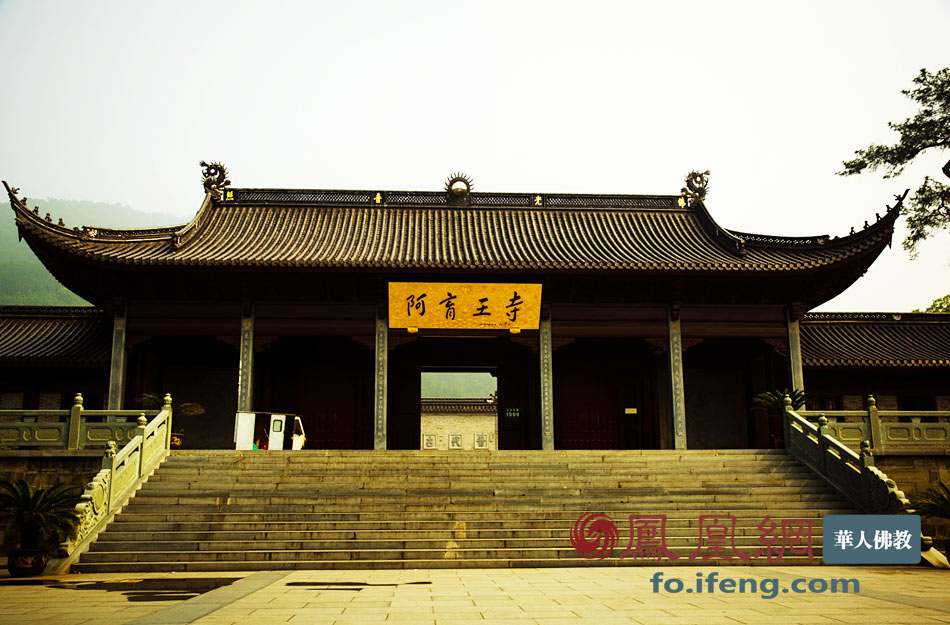
Ningbo Ayuwangsi.
The temple’s origins are steeped in legend. It is said that a monk named Huida (Liu Saha in his secular name) discovered a sacred relic of the Buddha at this location, prompting him to erect a pagoda for its veneration. This relic, believed to be a piece of the Buddha’s remains, was part of the larger tradition of relic worship that Ashoka famously promoted. Known for commissioning the construction of 84,000 stupas to house Buddha’s remains, Ashoka’s influence is evident in the very name and purpose of the temple.
Over the centuries, Ayuwangsi evolved into a prominent center for Buddhist learning and practice. During the Southern and Northern Dynasties, it became a pivotal site for the propagation of Buddhism in southern China, earning the endorsement of influential figures such as Emperor Wu of Liang, who granted it the official name “Ayuwangsi.” By the Tang Dynasty, the temple had secured its place as one of the “Five Mountains of Zen” in China, alongside other renowned sites like Lingyin Temple in Hangzhou.
The temple flourished during the Song Dynasty, receiving significant patronage for repairs and renovations. Famous scholars and poets, including Su Shi and Wang Anshi, visited and left behind inscriptions that further cemented its cultural significance. However, like many historical sites, Ayuwangsi faced challenges during the tumultuous periods of the Yuan and Ming Dynasties, experiencing periods of decline and restoration.
The Qing Dynasty marked another high point for the temple as emperors Kangxi and Qianlong visited, leaving their marks through inscriptions that celebrated its spiritual and cultural value. This royal recognition helped solidify Ayuwangsi’s status as a sacred site for both local devotees and international pilgrims.
In modern times, Ayuwangsi has adapted to the challenges of contemporary society while preserving its historical essence. Designated as a National Key Buddhist Temple by the State Council in 1983, it underwent extensive restoration to maintain its architectural integrity and cultural heritage. Today, it stands not only as a site of religious significance but also as a popular destination for tourists and scholars alike, drawing visitors eager to connect with its serene ambiance and rich history.
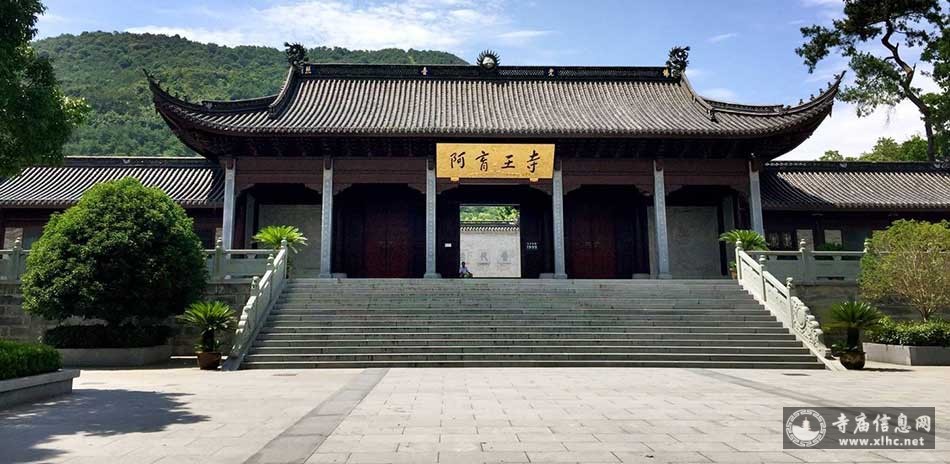
Ningbo Ayuwangsi.
The architecture of Ayuwangsi is a harmonious blend of traditional Chinese and Buddhist styles, featuring a meticulously planned layout that includes the grand entrance gate, the Hall of Heavenly Kings, the Mahavira Hall, and the sacred Relic Hall that houses the Buddha’s relic. Each structure tells a story of devotion, artistry, and spiritual pursuit, inviting visitors to partake in its tranquil surroundings.
As you explore the temple complex, you are not just witnessing an architectural marvel; you are stepping into a living narrative that spans centuries. Each corridor and courtyard evokes a sense of peace and reflection, making Ayuwangsi a truly remarkable destination for those seeking to understand the profound impact of Buddhism in China and the enduring legacy of Emperor Ashoka.
Main Highlights: What to See at Ningbo Ayuwangsi
Nestled in the scenic hills of Ningbo, the Ayuwangsi (阿育王寺) stands as a magnificent testament to over 1,700 years of history and Buddhist culture. Heralded as one of China’s Four Great Buddhist Monasteries, this sacred site is not only a spiritual haven but also a treasure trove of historical artifacts and architectural beauty.
A Historical Gem
Founded in 282 AD during the Western Jin Dynasty, Ayuwangsi is the only temple in China named after the Indian Emperor Ashoka, renowned for his role in propagating Buddhism across Asia. The temple houses the revered relics of Shakyamuni Buddha, making it a significant pilgrimage destination for devout Buddhists and history enthusiasts alike.
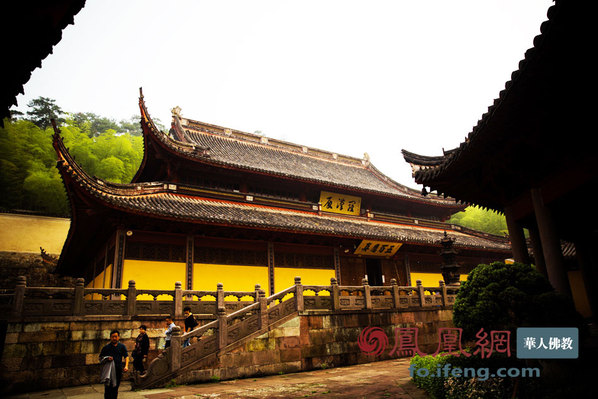
Ningbo Ayuwangsi.
Architectural Marvels
As you enter the temple grounds, you are greeted by a series of impressive structures aligned along a central axis. Key highlights include the majestic Tianwang Hall, the resplendent Daxiong Baodian (Great Hero Hall), which features a stunning statue of the Buddha, and the sacred Relic Hall that holds the temple’s most prized possession—the relics of the Buddha. The intricate carvings and traditional architectural elements reflect the rich craftsmanship of ancient Chinese builders.
Natural Serenity
Surrounded by tranquil mountains and lush greenery, Ayuwangsi is an oasis of peace. The serene environment, complemented by the gentle sound of flowing streams and rustling leaves, creates a perfect backdrop for reflection and meditation. With the changing seasons, visitors can witness the beauty of blooming flowers in spring, vibrant foliage in autumn, and the tranquil stillness of winter.
Culinary Delights
No visit to Ayuwangsi is complete without savoring the temple’s renowned vegetarian cuisine. Served daily from 11:00 AM to 1:00 PM, the free vegetarian meal is prepared using fresh, local ingredients, offering a taste of the monks’ simple yet flavorful lifestyle. Dishes like steamed vegetables and savory dumplings provide a delightful culinary experience that nourishes both the body and soul.
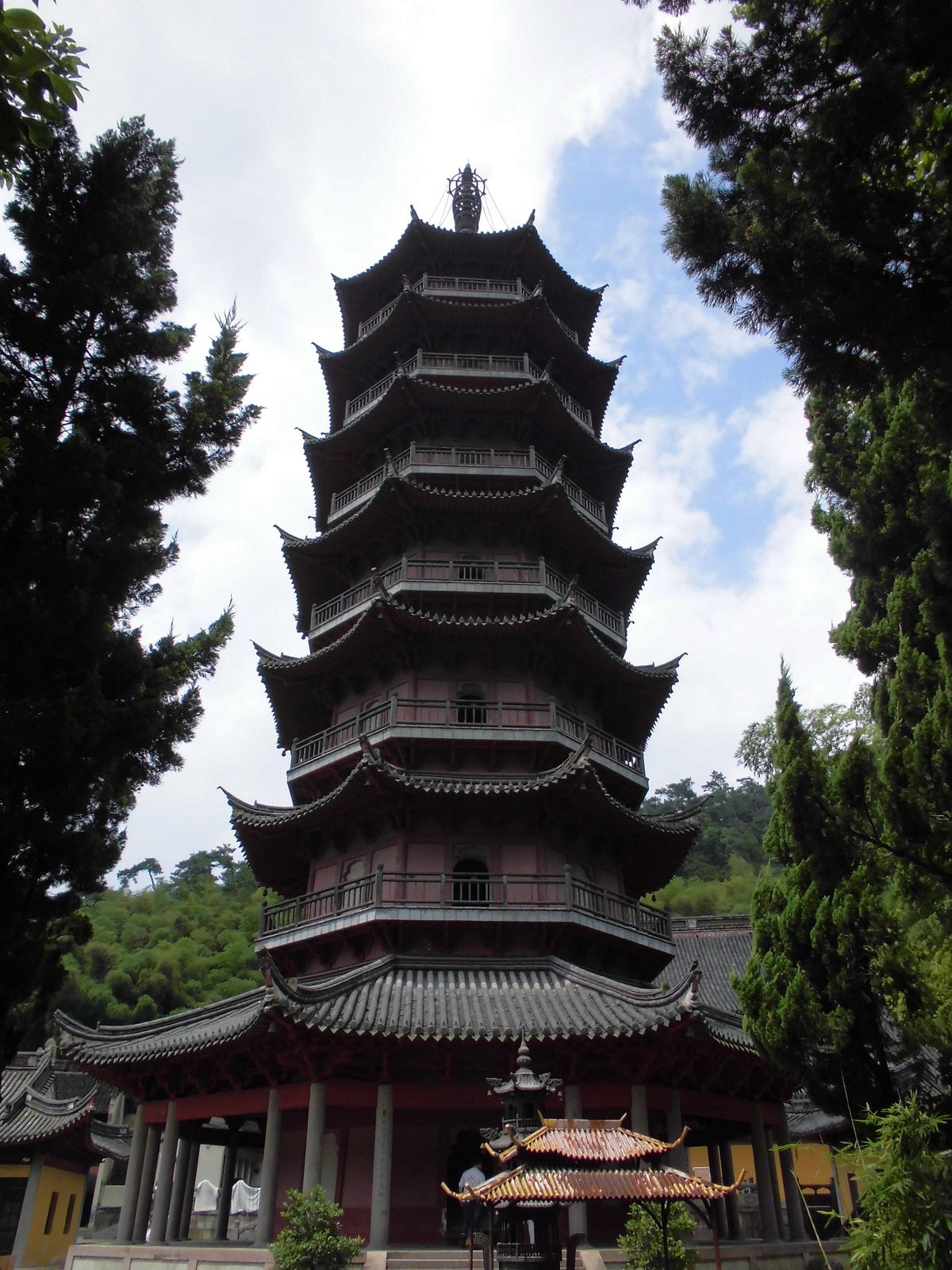
Ningbo Ayuwangsi.
Cultural Significance
Ayuwangsi is not just a place of worship; it is a cultural landmark that has witnessed centuries of Buddhist practices and teachings. The temple has been a gathering place for scholars and monks throughout history, contributing to the development of Buddhist philosophy and art in China. Visitors can explore ancient inscriptions and stone carvings that narrate the temple’s storied past.
Visitor Information
– Location: 1999 Wuxiang East Road, Wuxiang Town, Yinzhou District, Ningbo, Zhejiang Province.
– Opening Hours: Daily from 7:00 AM to 4:00 PM.
– Admission: Free entry, with opportunities for donations to support temple activities.
Whether you seek spiritual enlightenment, a deeper understanding of Buddhist culture, or simply a peaceful retreat in nature, Ayuwangsi offers an unforgettable experience. Embrace the serenity, explore the rich history, and let the sacred atmosphere of this ancient temple leave a lasting impression on your journey through Ningbo.
Planning Your Visit: A Practical Guide
Practical Guide to Ningbo Ayuwangsi (阿育王寺)
Ningbo Ayuwangsi, also known as Ashoka Temple, is a stunning historical site located in Zhejiang Province, China. With its rich history, serene environment, and significant cultural value, it is a must-visit destination for travelers seeking to explore Buddhist heritage. This guide will provide you with essential information to enhance your visit to this remarkable temple.
Location and Getting There
Ayuwangsi is situated at 1999 Wuxiang East Road, Wuxiang Town, in the Yinzhou District of Ningbo. The temple lies at the foot of Mount Ayuwang and is surrounded by lush greenery and beautiful landscapes.
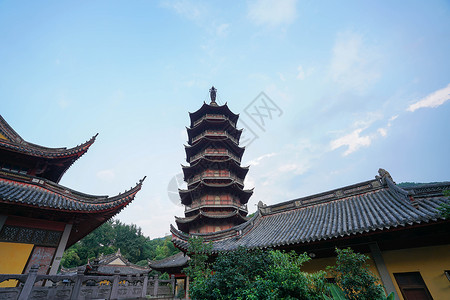
Ningbo Ayuwangsi.
Transportation Options:
– By Metro: Take Line 1 of the Ningbo Metro and get off at Baoduang Station (宝幢站). From there, it’s about a 15-25 minute walk to the temple.
– By Bus: Several bus lines, including 155, 758, and 162, serve routes to the temple. Check local schedules for the most convenient option based on your starting point.
– By Car: If you’re driving, you can navigate directly to the temple, which has available parking.
Opening Hours and Admission
Ayuwangsi is open to visitors daily from 7:00 AM to 4:00 PM, and the best time to visit is in the morning to avoid crowds and enjoy the tranquil atmosphere. Admission to the temple is free, making it accessible to all who wish to experience its beauty and spirituality.
Key Attractions
The temple is home to several significant buildings and features:
-
Main Hall (大雄宝殿): The centerpiece of the temple, housing a magnificent statue of Shakyamuni Buddha. The hall’s architecture showcases intricate carvings and cultural artistry, making it a focal point for visitors.
-
Tianwang Hall (天王殿): This hall features statues of the Four Heavenly Kings, guarding the temple and adding to the spiritual ambiance.
-
Relic Hall (舍利殿): This sacred space is where the true relics of Shakyamuni Buddha are kept, and it is a site of pilgrimage for many. Visitors often find a deep sense of reverence here.
-
Scripture Library (藏经楼): A repository of Buddhist texts and historical documents, this library offers insight into Buddhist teachings and the temple’s storied past.
-
Fish Happiness Pool (鱼乐池): A serene pond located within the temple grounds, where visitors can enjoy the soothing sounds of water and observe koi fish swimming peacefully.
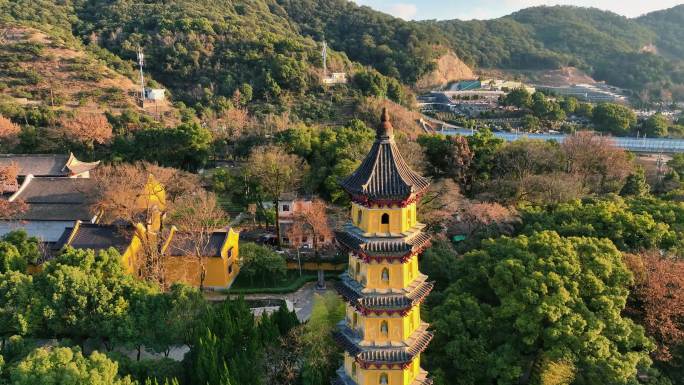
Ningbo Ayuwangsi.
Dining Options
While visiting Ayuwangsi, do not miss the opportunity to try the free vegetarian lunch offered at the temple. Served daily from 11:30 AM to 1:00 PM, the meal features fresh, locally sourced ingredients prepared in a simple yet flavorful manner. This is a great way to experience the temple’s commitment to health and mindfulness.
Recommended Activities
-
Meditation and Reflection: Take time to sit in the gardens or near the Fish Happiness Pool, allowing the serene surroundings to facilitate meditation and reflection.
-
Photography: Capture the stunning architecture and natural landscapes that surround the temple. Notable spots include the entrance gate, the main hall, and the tranquil gardens.
-
Cultural Immersion: Participate in any ongoing Buddhist rituals or ceremonies, which often provide a unique insight into local practices and beliefs.
Tips for Visitors
- Dress Appropriately: Wear modest clothing that covers your shoulders and knees, as a sign of respect while visiting the temple.
- Stay Quiet: Maintain a peaceful demeanor to respect the spiritual atmosphere, especially in prayer halls and during rituals.
- Plan Ahead: Check the weather and seasonal events before your visit to ensure a smooth experience.
Nearby Attractions
If you have extra time, consider exploring other nearby attractions, such as:
– Tian Tong Temple: An ancient temple known for its tranquility and historical significance.
– Yuyuan Garden: A beautiful traditional garden that offers a glimpse into classical Chinese landscape design.
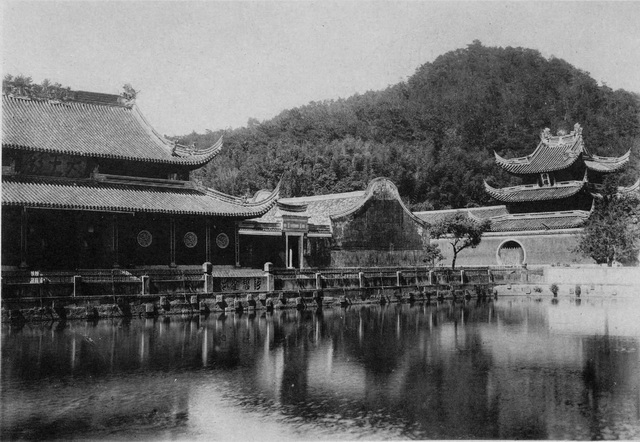
Ningbo Ayuwangsi.
Visiting Ningbo Ayuwangsi is not just a chance to admire historical architecture; it is an opportunity to connect with the rich traditions of Buddhism and experience a profound sense of peace. With its free entry, stunning surroundings, and cultural significance, Ayuwangsi is a destination that promises to leave a lasting impression on every traveler.
Tickets, Hours, and Booking
Visiting Ningbo’s Ayuwangsi Temple (阿育王寺) is a remarkable experience, not only for its stunning architecture and serene environment but also because entry to this historic site is completely free of charge.
The temple is open to visitors daily from 7:00 AM to 4:00 PM, allowing ample time for exploration and reflection. As you arrive, you’ll be greeted by the majestic entrance gates and the tranquil atmosphere that envelops the temple grounds, nestled among lush greenery and picturesque mountains.
While there are no admission fees, if you wish to enhance your visit, consider participating in the temple’s free vegetarian meal service, which is available daily from 11:00 AM to 1:00 PM. This is a wonderful opportunity to enjoy a simple yet nutritious meal in a peaceful setting, surrounded by the temple’s spiritual ambiance.
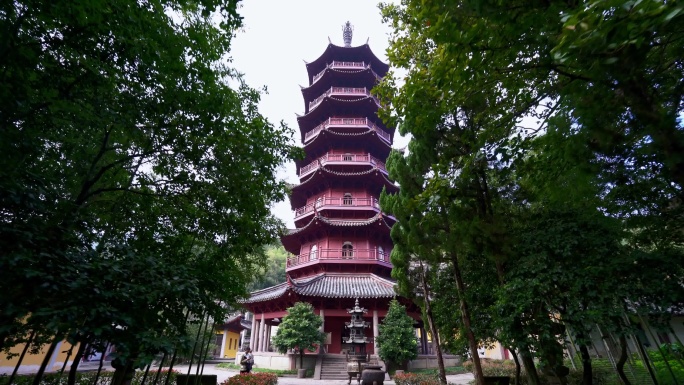
Ningbo Ayuwangsi.
Getting There
To reach Ayuwangsi Temple, you can take advantage of the convenient public transport options available in Ningbo:
– Metro: Take Line 1 to Baoguang Station, and from there, it’s approximately a 15- to 25-minute walk to the temple.
– Bus: Several bus routes service the area, including routes 759-1, 155, and 162.
Tips for Your Visit
- Plan your visit for the morning hours to avoid crowds and enjoy the temple in a more tranquil setting.
- Dress modestly, as this is a sacred site. Comfortable, respectful attire is recommended.
- Don’t forget to take part in the community atmosphere, whether by lighting incense, wandering the gardens, or simply enjoying the serene environment.
With no entry fees and the chance to enjoy a free meal, Ayuwangsi Temple presents an accessible and enriching experience for all who wish to explore its spiritual and cultural significance.
How to Get There
Reaching Ningbo Ayuwangsi (阿育王寺) is relatively straightforward, thanks to the city’s efficient transportation network. Whether you’re arriving from within Ningbo or traveling from afar, there are several convenient options to consider.
By Metro
The Ningbo Metro is a reliable and efficient way to reach Ayuwangsi. Travelers can take Line 1 and alight at Baodong Station (宝幢站). From Exit D, it’s about a 15 to 25-minute walk to the temple. The path is scenic, taking you through local neighborhoods and giving you a glimpse of daily life in Ningbo.
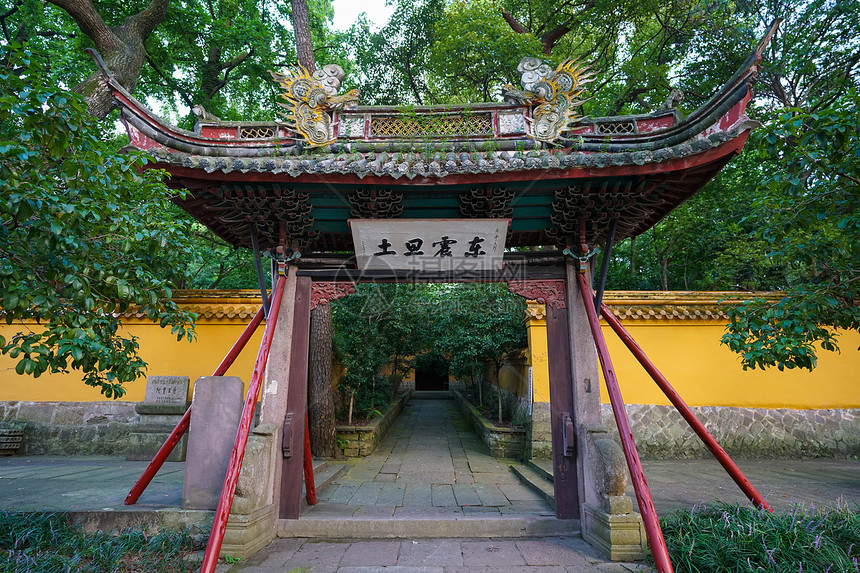
Ningbo Ayuwangsi.
By Bus
Ningbo’s bus system is extensive and connects various parts of the city to Ayuwangsi. Here are some bus lines that stop near the temple:
– Line 155
– Line 162
– Line 759-1
– Line 790
– Line 107-1
Consult local bus schedules for the latest information on routes and frequency, as these can vary throughout the day.
By Taxi or Ride-Hailing Services
For those preferring a more direct route, taxis and ride-hailing services like Didi are widely available throughout Ningbo. A taxi from the city center to Ayuwangsi will take approximately 30 minutes, depending on traffic, and should cost around ¥50-¥80. Ride-hailing apps provide a convenient option, especially for non-Chinese speakers, as they allow you to enter your destination via GPS.
By Car
If you’re driving, the temple is located at 1999 Wuxiang East Road, Wuxiang Town, Yinzhou District, Ningbo. There is ample parking available near the temple’s entrance. For those unfamiliar with the area, using a GPS or a navigation app is highly recommended to ensure you find the best routes.
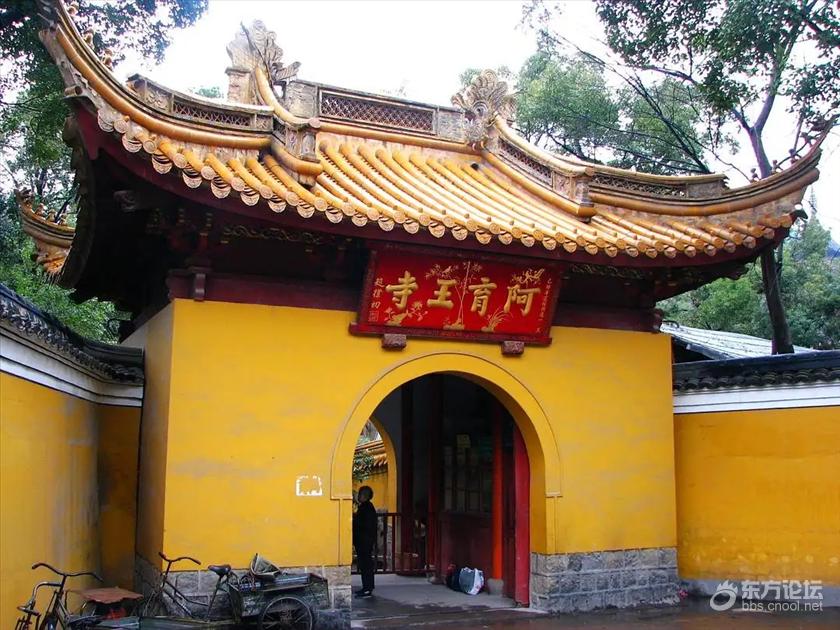
Ningbo Ayuwangsi.
Nearby Attractions
Ayuwangsi is surrounded by lush mountains and other cultural sites. If you’re planning to explore the area further, consider visiting nearby attractions like:
– Tian Tong Temple (天童寺), which is also part of Ningbo’s rich Buddhist heritage.
– Yuyuan Garden, a beautiful and tranquil space perfect for a stroll after your visit to the temple.
Tips for Travelers
- Best Time to Visit: Arriving early in the morning is advisable to avoid larger crowds and to enjoy the serene atmosphere of the temple.
- Dress Code: As with many religious sites, visitors should dress modestly. Comfortable walking shoes are recommended, as the temple grounds can involve some walking.
- Transport Apps: If you’re not fluent in Chinese, downloading a translation app can be helpful when interacting with locals or navigating public transport.
With its accessible location and the variety of transportation options available, visiting Ningbo Ayuwangsi is a seamless experience, allowing you to fully immerse yourself in the tranquility and beauty of this historic temple.
Local Cuisine and Accommodation
Visiting Ningbo Ayuwangsi (阿育王寺) offers a unique opportunity to immerse yourself in a serene atmosphere rich in Buddhist history, culture, and cuisine. After exploring this ancient temple, you can indulge in delicious vegetarian meals and unwind in comfortable accommodations nearby. Here’s a guide to some of the best food and lodging options to enhance your experience.
Vegetarian Dining Experience
One of the highlights of visiting Ayuwangsi is the chance to savor traditional vegetarian cuisine, reflecting the temple’s Buddhist values. The temple itself offers a free vegetarian meal daily from 11:00 AM to 1:00 PM. This meal is not only a delightful treat for the palate but also a unique way to experience the spirit of the temple, as the food is prepared with fresh, local ingredients and a focus on simplicity and nourishment.
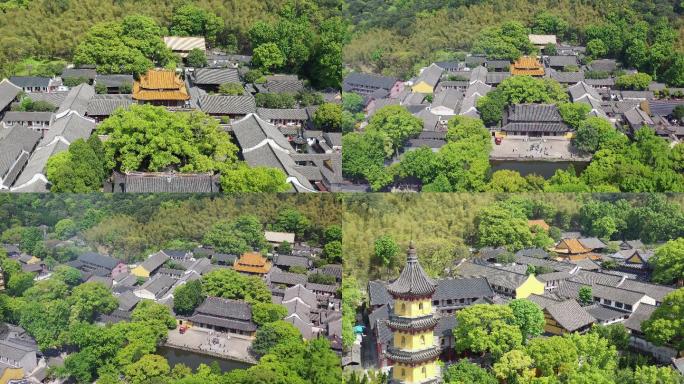
Ningbo Ayuwangsi.
Recommended Dishes:
- Vegetable Tofu Stir-fry: A light dish featuring tender tofu paired with seasonal vegetables, cooked to perfection while retaining their natural flavors.
- Vegetarian Dumplings: Soft and fluffy dumplings filled with an assortment of ingredients like mushrooms, greens, and bean paste, offering a delightful burst of flavors in every bite.
- Buddha’s Delight: A medley of various stir-fried vegetables and tofu, often enriched with aromatic sauces, creating a wholesome and satisfying meal.
For those looking to dine outside the temple, several local vegetarian restaurants in Ningbo offer a variety of dishes that cater to different tastes. Here are a couple of popular options:
-
Loving Hut Vegan Restaurant: Known for its diverse menu, this restaurant offers a range of vegan dishes that are both delicious and filling. Dishes such as vegan stir-fried noodles and curry are must-tries.
-
Vegetarian Delight: Located in the city center, this restaurant specializes in traditional Chinese vegetarian cuisine. The ambiance is cozy, making it an excellent spot for a relaxing meal after a day of sightseeing.
Comfortable Accommodations
After a fulfilling day of exploring the spiritual and cultural treasures of Ayuwangsi, it’s essential to find a comfortable place to rest. Below are some recommended accommodations that provide a restful environment along with excellent amenities.
1. Hilton Ningbo Dongqian Lake Resort
Just a short drive from Ayuwangsi, this resort combines modern luxury with the tranquility of nature. The spacious rooms offer stunning views of Dongqian Lake. Guests can enjoy various amenities, including a swimming pool, spa, and fitness center. The on-site restaurants feature a range of cuisines, including local dishes and international fare.
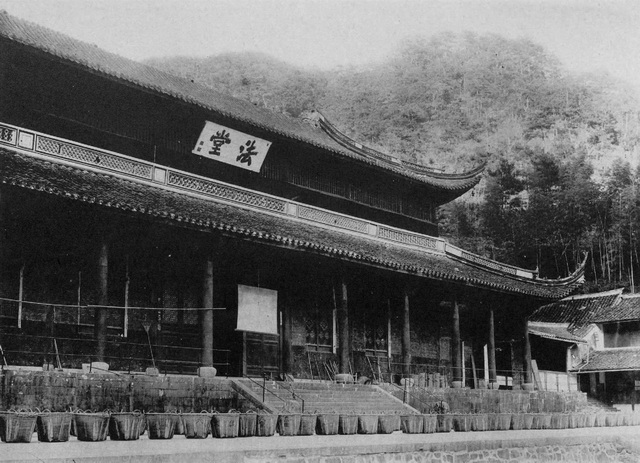
Ningbo Ayuwangsi.
2. Ningbo Marriott Hotel
Situated in the heart of Ningbo, this hotel offers stylish rooms with contemporary decor and all the essential amenities. Guests can unwind at the rooftop bar, which provides a panoramic view of the city skyline. The hotel also features multiple dining options, including an exquisite buffet and a Chinese restaurant.
3. Sofitel Ningbo
This upscale hotel is known for its elegant design and exceptional service. It’s located close to the city center, making it convenient for exploring local attractions. The hotel houses several restaurants that serve both Western and Asian cuisines, catering to various dietary preferences.
4. Ningbo Jiangdong Grand Hotel
For those seeking a more budget-friendly option without compromising comfort, this hotel offers clean and comfortable rooms at reasonable rates. It’s conveniently located near public transportation, making it easy to access Ayuwangsi and other attractions.
In Summary
Ningbo Ayuwangsi is not just a destination for spiritual reflection; it also offers a delightful culinary journey and comfortable accommodations. Whether you choose to enjoy a traditional vegetarian meal at the temple or explore local dining options, your taste buds will be treated to a variety of flavors. After a day of exploration, retreat to one of the nearby hotels to relax and recharge for another day of adventures.
Frequently Asked Questions
-
What are the opening hours for Ningbo Ayuwangsi?
Ningbo Ayuwangsi is open daily from 7:00 AM to 4:00 PM. It is advisable to visit in the morning to avoid crowds and enjoy the serene atmosphere. -
Is there an entrance fee to visit Ningbo Ayuwangsi?
Entry to Ningbo Ayuwangsi is free of charge, making it an accessible destination for visitors. -
Where is Ningbo Ayuwangsi located?
The temple is situated at 1999 Wuxiang East Road, Wuxiang Town, Yinzhou District, Ningbo City, Zhejiang Province, China. It is nestled in a picturesque mountainous area. -
What are the main attractions within the temple complex?
Key highlights include the Great Hero Hall, the Hall of the Heavenly Kings, the Relics Hall, and the Scripture Repository. Each building features distinctive architecture and rich historical significance. -
Are there any dining options available at Ningbo Ayuwangsi?
Yes, the temple offers a free vegetarian meal for visitors between 11:00 AM and 1:00 PM daily. The dishes are prepared using fresh, local ingredients, emphasizing a healthy and light diet. -
How can I get to Ningbo Ayuwangsi?
Visitors can reach the temple via public transportation. The nearest metro station is Baogong Station on Line 1, from which it is a 15-25 minute walk to the temple. Buses also serve the area, providing various options for getting there. -
What should I wear when visiting Ningbo Ayuwangsi?
It is recommended to dress conservatively—avoid shorts and short skirts—to respect the sacred atmosphere of the temple. Comfortable walking shoes are also advisable, as the terrain may involve some walking. -
What is the best time of year to visit Ningbo Ayuwangsi?
The ideal times to visit are during spring (March to May) and autumn (September to November), when the weather is mild and conducive for exploration.
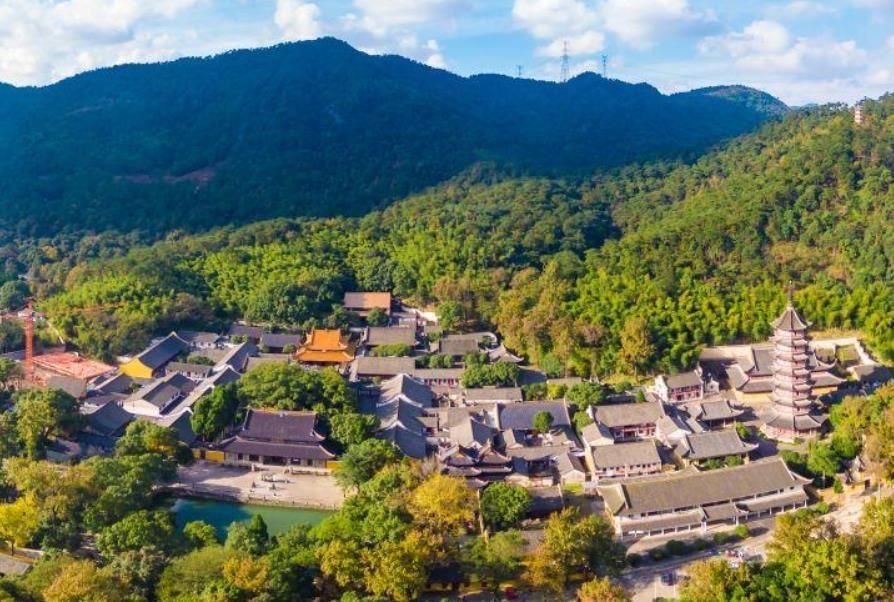
Ningbo Ayuwangsi.
Final Thoughts on Your Trip
Visiting Ningbo Ayuwangsi is not just a journey through a historical site; it’s an immersive experience that connects you to centuries of rich Buddhist tradition and cultural heritage. The serene atmosphere enveloped by ancient trees and the majestic architecture of the temple itself invite introspection and tranquility. As you wander through the sacred halls and gaze upon the revered relics, you can sense the echoes of countless pilgrims who have sought solace and enlightenment within these walls.
This revered temple, the only one in China named after the great Indian Emperor Ashoka, stands as a testament to the enduring legacy of Buddhism and its teachings. Whether you are a devout follower, a history enthusiast, or simply someone seeking peace in a chaotic world, Ayuwangsi offers a sanctuary for reflection and spiritual growth.
As you plan your visit, remember to take the time to savor not only the stunning architecture and rich history, but also to indulge in the unique experience of the temple’s vegetarian cuisine, which embodies the essence of Buddhist philosophy. In this tranquil haven, allow yourself to disconnect from the hustle of daily life and reconnect with your inner self.
Ningbo Ayuwangsi is not just a destination; it’s a pilgrimage of the heart. So pack your bags, open your mind, and let the serene spirit of this ancient temple guide you towards a deeper understanding of both history and yourself.
